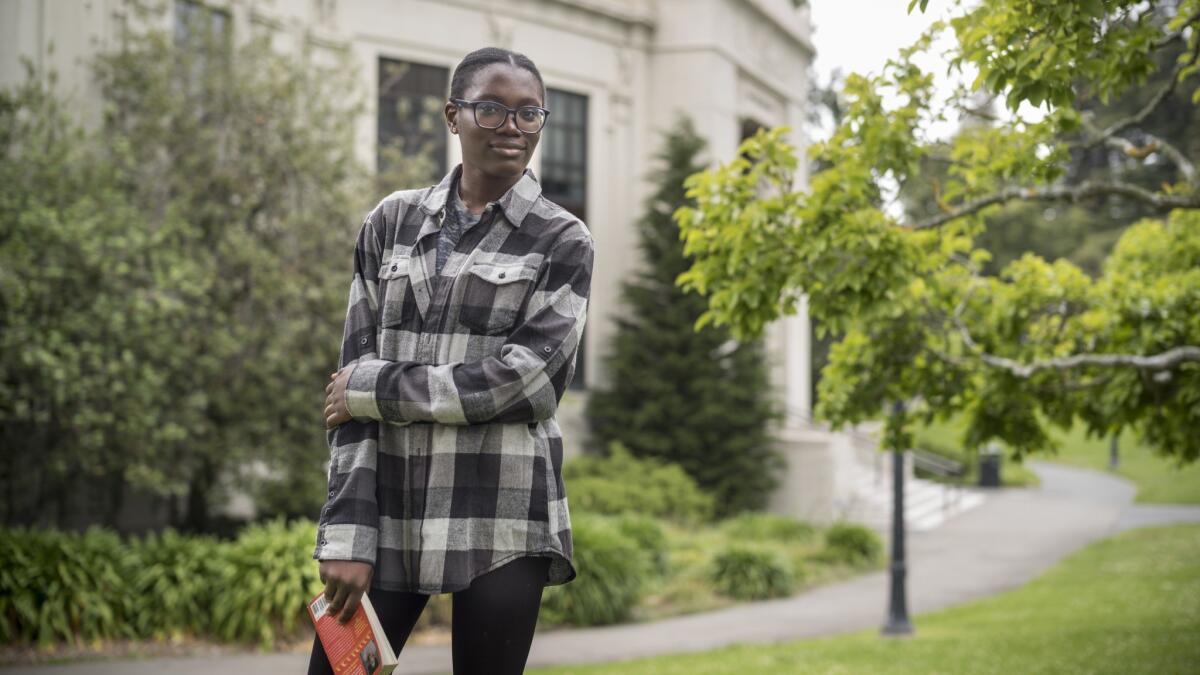UC Berkeley student’s persistence helps win more liberal rules for in-state tuition

Reporting from San Francisco — Ifechukwu Okeke thought she’d be a shoo-in for in-state tuition when she was admitted to UC Berkeley for fall 2016.
She had moved to the United States from Nigeria in 2012 to go to Chaffey College in Rancho Cucamonga. By the time she got her acceptance to transfer to UC to study molecular and cell biology, she had lived in California four years. She had a California driver’s license, bank account and rental records as proof.
UC Berkeley, however, ruled she was a nonresident — which meant she would have to pay nearly $27,000 more.
The university said Okeke failed to meet its requirement to show she had been financially independent from her out-of-state parents for at least two years. She had only filed a tax return one year, but UC Berkeley required to see two years.
Okeke was stunned. Without enough money for nonresident tuition, she was forced to withdraw her acceptance. But she began showing up at University of California regents meetings to plead her case over and over again.
The effort may have seemed quixotic, but the regents heard her story. Last week, they unanimously approved a key change that will help people in her situation, starting in the 2019-20 academic year.
“I’m in disbelief,” said Okeke, now 21. “I have mixed feelings about how long it took, but also a huge sense of jubilation that student advocacy does make a difference.”
UC regents did not change two core state requirements for residency. Students must live in California for more than one year. They also must prove they intend to make the state their primary and permanent home, through such documents as California tax returns and driver’s licenses.
But UC now will conform with state law and require students under 24 to show one year of independence from their parents, not two.
UC officials said they were unsure how many students would be helped. Christopher Carter, UC director of student financial support, said about a quarter of students who accept UC admission offers — roughly 17,500 freshmen and transfer students last year — don’t have completely clear residency status.
About 300 students appeal their residency decisions each year. With the changes, Carter has told regents, successful appeals could go up from 5% to 10% to as many as one-third.
Students who qualify for California residency are able to access state and UC financial aid in addition to in-state tuition. The financial impact of the policy remains to be seen.
Okeke’s parents, both educators, supported her for about the first 18 months she attended Chaffey College. But after Nigeria’s economy began to crash in 2014, she said, her mother lost her job and the government suspended her father’s paycheck. She was forced to fend for herself, she said, by taking on several jobs, including tutoring biology, chemistry and math.
Okeke said she gave UC her bank records and W-2 forms to demonstrate her financial independence, but the university required the tax returns.
“I was heartbroken,” Okeke said.
Still, she volunteered with a UC Berkeley research project while working three jobs.
She also spoke out at four of the regents’ bimonthly meetings — starting in November 2016. She asked the regents not just to change the policy — which might take years — but to provide a temporary fix for students like herself who were in need of immediate aid.
Her persistence impressed Regent John A. Pérez, who met with her and then asked UC officials to brief regents about the residency issue at their May 2017 meeting.
“My sense, and I may be wrong on this, is if somebody’s motivated enough to come back over and over and over to raise an issue, it’s because there’s not a sense that it’s actually being dealt with,” Pérez said at that meeting.
Pérez and members of a UC task force proposed the revisions approved last week. The new policy also makes it easier for certain students, including those on active military duty or runaways who are homeless or at risk of homelessness, to qualify for residency, regardless of their parents’ situations. The changes bring UC’s residency policies in line with federal financial aid rules.
At last week’s meeting, Lt. Gov. Gavin Newsom, an ex-officio regent who is running for governor, asked how often families try to game the residency policy for the major financial savings. UC officials said they have caught some parents who moved to California long enough to appear to be residents but then moved home once their students were enrolled.
To guard against such abuse, UC regents did not change the university’s stricter-than-state-law policy that assumes most students under age 24 still are financially dependent on their parents and reside in the same state unless they can prove otherwise. California law ties student and parent residencies together only until age 18.
Okeke was not present for the regents’ vote last week, but she was overjoyed by the news. Although she was able to gain her residency status and re-enroll at Berkeley last year after filing a second year of tax returns, she said she hoped the changes would help — and inspire — future students.
“This tells me that no one is insignificant in causing change,” she said. “There’s nothing too big to take on.”
teresa.watanabe@latimes.com
Twitter: @teresawatanabe
More to Read
Sign up for Essential California
The most important California stories and recommendations in your inbox every morning.
You may occasionally receive promotional content from the Los Angeles Times.











